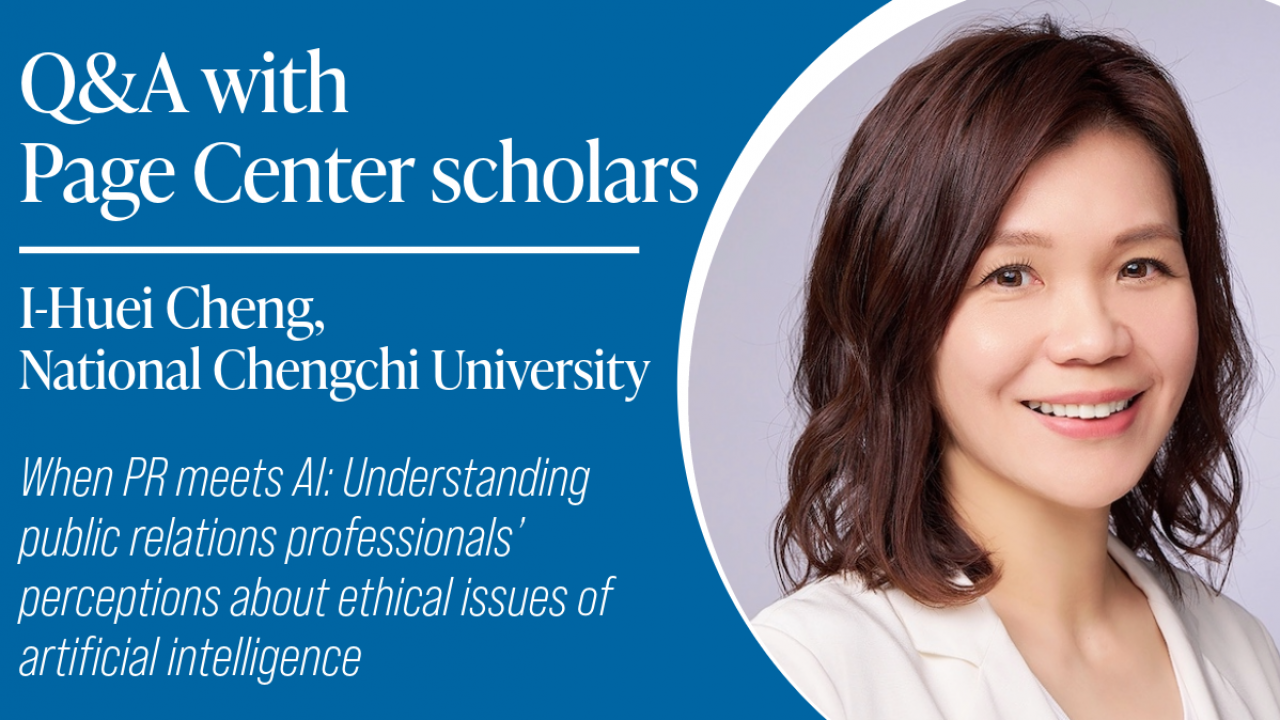November 29, 2023
PR as counsel for the ethical use of AI – Scholar Q&A with I-Huei Cheng

The infiltration of artificial intelligence into nearly all aspects of business may mean new responsibilities for public relations practitioners. Page Center scholars I-Huei Cheng, National Chengchi University; Karla Gower, University of Alabama; and Seow Ting Lee, University of Colorado Boulder, are leading a project that will help reveal some of those responsibilities. The project will also learn how practitioners view AI and how they understand their role in ensuring its ethical use. Their results will help organizations identify how the public relations department can provide counsel for using AI responsibly. Cheng, who discusses the project in the Q&A below, and Lee are two-time Page Center scholars. This project is Gower’s first as a scholar with the Center. The study is a part of the Page Center’s 2023 call for research proposals on digital analytics.
How did you and your collaborators come together to start this project?
Dr. Gower, Dr. Lee, and I are all researchers with interest in ethics and we all teach public relations, so in a way that's pretty natural. I got interested in AI and asked if they were interested in working on something together. We all know it’s a new topic that is getting a lot of attention, and I'm excited to work with friends to explore the topic in this project.
Your project is specifically looking at AI in public relations. Can you explain why it’s important to determine AI’s role in the profession?
AI is a technology that's developing at a global scale. No matter where we are, we are all under the influence of it. It’s reshaping our professional and personal lives. We have seen in surveys that ethical concerns of AI have attracted significant public attention. So, our question is: As public relations professionals, how can we help organizations sustain public trust in this new uncharted age of algorithms and big data? We want to address the ethical concerns from the perspective of PR and offer insights into how practitioners can serve as ethics counsel.
How do you plan to identify the ways companies can do this?
Our plan is to conduct a survey of PR practitioners with two overarching research goals. First, assess the practitioner’s view of ethical issues with AI technologies. There may be some basic questions like: What AI technologies do you use? How do you use it? What do you see as the professional challenges? Second, we hope to identify the best practices in addressing the ethical risks of AI in organizations. We want to identify the approaches that will direct the organizations in a way that helps them maintain public trust.
Do you have any ideas on what the perceptions might be at the moment based on studies you’ve seen so far?
I think there is a gap in the literature. Surveys have been done with the general population, but in terms of PR practitioners – how AI is viewed or what practitioners think about it – those dimensions are still unknown. This project touches on ethics, and ethics is an area where most of the previous work is normative and prescriptive, like telling us what we should do. In our literature review so far, we have seen how business and marketing scholars have started to pay attention to the impact of AI and to call for ethics research. I think it's time for our field to devote more research attention to AI ethics. We want to integrate what we have seen in the literature into our project, and we hope that we can offer theoretically and empirically driven perspectives for public relations specifically.
Once you have collected the data, how do you foresee organizations using your results? What are your expectations in terms of the practical uses that are gained from this project?
There is a certain level of excitement about AI in the industry, but I think that excitement is accompanied by feelings of fear and anxiety, as well. The excitement may come from the potential of AI in saving our time and labor; helping us write or generate content; and enhancing effectiveness in targeting audiences. At the same time, my sense is that many PR practitioners may feel they are not yet ready for the challenges, including how to deal with the unknown threats. That could potentially jeopardize their relationship with their publics or threaten their own professional integrity. It is important to identify those challenges. The voices of PR practitioners are fundamental to our project. We hope to have an empirical perspective grounded in professional understanding. So, our findings can be used to raise awareness of ethical risks and responsible applications of AI and advocate for ethical considerations in decision making in organizations.
Can you talk about the Page Center’s role in this project and how it helps you achieve your research goals?
We greatly appreciate having this opportunity. We thank the Page Center for supporting our project and organizing the Research Roundtable session with board members back in June. I thought it was a really wonderful experience. My colleagues and I appreciated having the opportunity to receive feedback on our project and hear the views of senior practitioners who have many years of experience in the field. I feel this is truly an opportunity that bridges academia and the industry in public relations.
